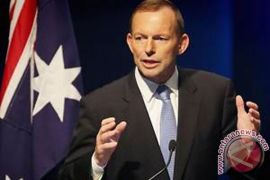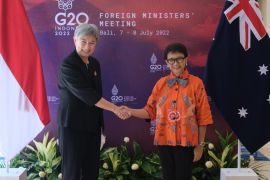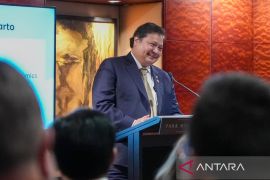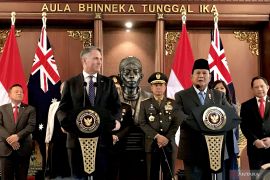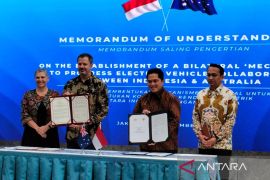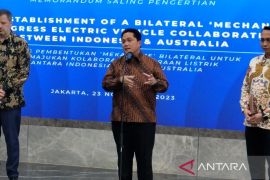For Asian immigrants seeking a better life, particularly those from Afghanistan, Myanmar, Sri Lanka, Iraq, and Iran, Australia has become a favored destination.
As Australia and Indonesia share maritime borders, foreign immigrants, refugees and asylum seekers, often referred to as boat people, have used Indonesia as a transit country as they travel to Australia.
Until June this year, the number of registered asylum seekers and refugees entering Indonesia increased from 7,945 in 2012 to about 10,340, according to Mitra Salima from the office of the UNCR Jakarta office. And the number of boat people heading to Australia tends to increase from year to year.
Australia does not want to accept boat people and is copperating with Indonesia to stop them from reaching Australia, and as a consequence Indonesias immigration detention centers have become overcrowded.
But, bilateral relations between Indonesia and Australia have been strained following media reports revealing that in 2009 the Australian government had tapped the private phones of Indonesian President Susilo Bambang Yudhoyono, First Lady Ani Yudhoyono and several ministers and government officials.
In a strong protest over the illegal wiretapping conducted by Australian surveillance agencies, Indonesia has recalled its ambassador to Australia.
Later, being disappointed with the Australian governments stance in downplaying the scandal, Indonesia temporarily halted some cooperation programs with Australia, including the exchange of intelligence information, military cooperation and the handling of illegal immigrants.
"If Australia also wants to maintain good ties with Indonesia, I hope there will be official clarification (on the wiretapping) from Australia," President Yudhoyono said, when announcing the suspension of several cooperation agreements with Australia on November 20, 2013.
"If someone states that intelligence information can achieve anything, then I ask, in which direction does the intelligence go? Why should they wiretap their friends and not their enemies? I consider the matter to be serious, and not merely from a legal point of view. I think neither Australian nor Indonesian law allows their intelligence agencies to wiretap officials of other countries," Yudhoyono said.
As reported by The Sydney Morning Herald on November 20, Indonesian political specialist at ANU Greg Fealy told Fairfax Medias Breaking Politics that it was clear from President Yudhoyonos tweets that he was personally offended.
"I think he [SBY] probably feels that the Australians have almost betrayed him. Hes done so much to help Australia, and hes done things that have cost him politically and domestically," Fealy added.
Indonesian Foreign Minister Marty Natalegawa stated that all joint activities with Australia were under review because of revelations of Australian spying in 2009 and due to what he describes as the dismissive response of the Abbott government in recent weeks.
Indonesias National Police immediately followed up the presidents decision to review cooperation, saying that the police are no longer handling cases of illegal immigrants caught in Indonesian waters on their way to Australia.
"Violations being conducted beyond Indonesian waters are no longer our business," Chief of the National Police General Sutarman said on Friday (Nov 22).
General Sutarman noted that the police will no longer deal with legal violations occurring in international seas. "Violations happening outside Indonesias territories and even in international seas committed by Indonesian people will also no longer become our business. But, it will be our responsibility if it happens within Indonesian territories," he said.
A spokesman for Indonesias Law and Human Rights Ministry, Marolan J. Barimbing, recently told The Jakarta Post daily that his department was preparing to review several programs designed to prevent asylum seekers heading for Australia.
"Once there are instructions, we are ready to lower the level of cooperation," said Marolan, who is a former top official with the immigration department.
"We are anticipating such an instruction . . . Our priority is our national interest. Were working based on regulations set up to protect the country from illegal immigrants, not to serve another countrys interests," he said, as quoted by the English newspapers.
This position is supported by Deputy Executive Director of Human Rights Working Group Choirul Anam and Chairman of Setara Institute Hendardi.
Indonesias police and immigration officers do not need to prevent boat people from going to Australia, nor detaining them, they said on November 21, as quoted by Kompas daily.
Indonesian authorities might even consider releasing all foreign immigrants, refugees and asylum seekers currently being detained in immigration detention centers throughout the country. The government should also help them leave Indonesia.
"With the suspension of the cooperation in handling illegal immigrants, the authorities should let them go to their final destination," Choirul said.
The Indonesian police and immigration officials had previously caught boat people and prevented them from going to Australia, because there was cooperation between Indonesia and Australia, he added.
Hendardi said Indonesian authorities should release the detained foreign immigrants because their presence in the immigration detention centers have been a burden on the Indonesian government.
Reporter: Fardah
Editor: Aditia Maruli Radja
Copyright © ANTARA 2013

